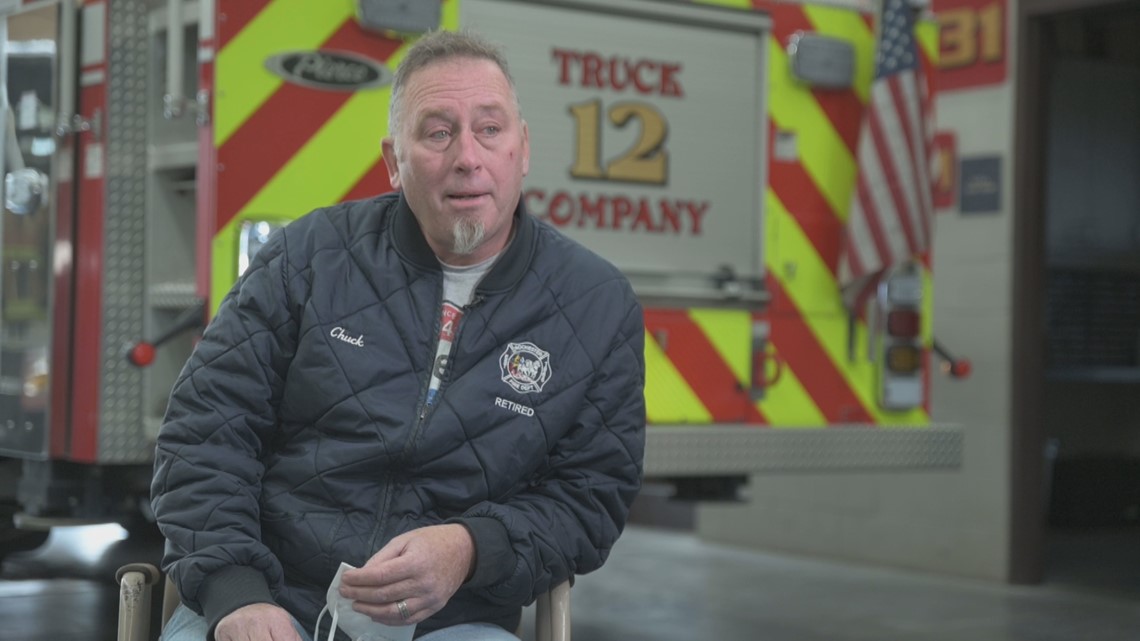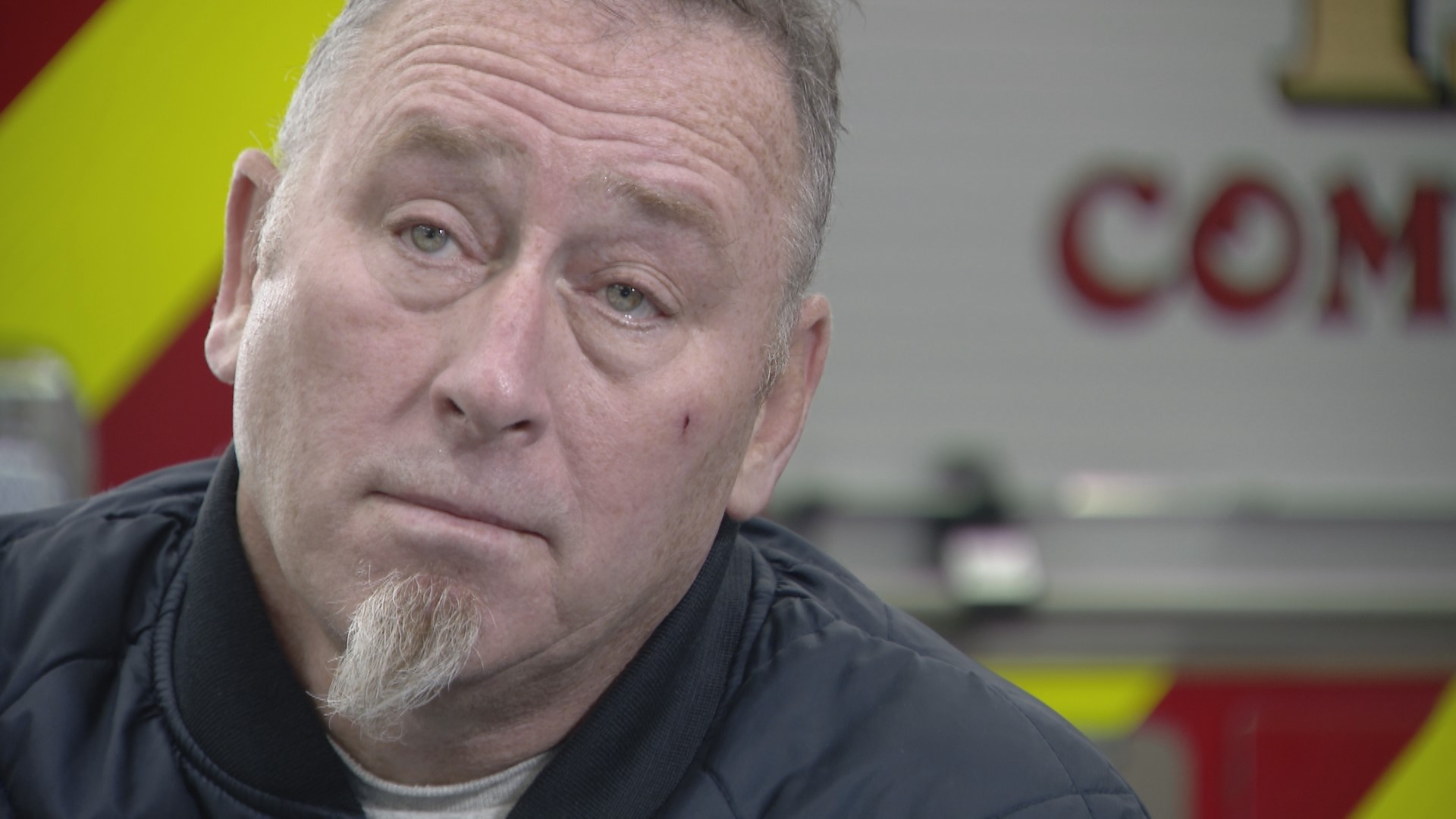ROCHESTER, Minn. — After three decades as a firefighter, Rochester Fire Captain Chuck Solseth naturally started thinking about retirement.
The 56-year-old Navy veteran, who started with Rochester in 1997 following a stint in Cedar Rapids, figured he might work for another year or two before calling it a career.
"It was becoming glaringly apparent that 60-year-old firemen are unusual in the service. It's hard work," Solseth said. "I started looking at, probably around 57, that'll probably be it for me."
Then his life turned upside down in late spring of 2021.
It started with heartburn and throat discomfort, which led to an endoscopy from Mayo Clinic, and then a dreaded cancer diagnosis. Doctors hoped they could contain the esophageal cancer with surgery and proton beam therapy, but in early September, Solseth's scans uncovered bad news. The cancer had spread to the hip, the liver, and elsewhere.
It was Stage IV.
Solseth started chemotherapy and quickly learned he would not be able to sustain maximum effort at work.


"When I told [the doctor] I was a firefighter... she said, 'you won't be doing that while chemo is going on,'" Solseth said. "I walked out of there and said, 'that's it.' I'm going to retire."
Solseth worked a final shift a few weeks later, responding to three medical calls but no fires.
And then he was done.
In the weeks since, Solseth has leaned on an enormous support network of family and friends to help him through his cancer battle. The Rochester Fire Department shared his story on Facebook, drawing dozens of shares and comments. "One of the best firefighters out there," said one Facebook user. And another: "Thank you for your service. Go beat this cancer you got this."
Last week, Solseth sat down with KARE 11 at Fire Station 3 in Rochester, to reflect on his career and share a message for others in the firefighting ranks. According to federal data cited by the Firefighter Cancer Support Network, firefighters have a 9% higher risk of getting cancer than the general population and a 14% higher risk of dying from it.
Solseth himself can personally name more than a half-dozen firefighters who've passed away from cancer.
The memories have come flooding to him over the past several weeks.
"My buddy Phil, sitting dying of stomach cancer in Cedar Rapids. My buddy Brett at the station had throat cancer. Same thing. He couldn't eat. He died in his mid-forties. That's what you think about," Solseth said. "You're making plans for retirement, and all the sudden, it's not necessarily for sure."
Although it's not always possible to link individual cases to firefighting, the constant on-the-job exposure to toxins and carcinogens clearly takes a toll.
"There's a lot of cancer out there in the fire service. It's one of the leading causes of firefighters' deaths," Solseth said. "The best thing I can say is, early detection. Have a good relationship with your doctor, and if you have something that pops up, don't put it off."
Rochester Fire Captain Caleb Feine, who is also heavily involved in preventative efforts and the Firefighter Cancer Support Network, has helped his department transform safety practices in recent years, mirroring trends nationwide.
The Rochester Fire Department has better protective tools these days to keep contaminants out of their trucks, and they use multiple sets of turnout gear so that dirty equipment can be washed religiously.
"It's about changing the culture," Feine said. "We can't not go into a burning building. We can't not serve the public -- that's what we do, it's a calling. But, doing it safer. Is there a different turnout gear that's better? Are there different ways to fight fire that keeps us safer? A better way to clean?"
Feine has known Solseth for almost two decades.
"It just hits you like a hammer when it's someone you know. It's just different," Solseth said. "A lot has been learned [about firefighter cancer] in the last 5 to 10 years. We're progressing leaps and bounds, and I think 10 years down the road from now, I hope we're still continuing to learn so we can stop diagnosing friends and co-workers with cancer. Because it's hard."
In Minnesota specifically, the state legislature recently passed the Hometown Heroes Act to provide financial support to firefighters who contract cancer or cardiac problems on the frontlines, and in a landmark move earlier this month, the state recognized a firefighters' death from cancer as a line-of-duty casualty.
"The monetary support is great. But the biggest thing is, let's figure out where this is coming from," Feine said, "so we can figure out how we can change this going forward so we don't break up families, and firefighters can work long and be healthier."
Even in retirement, Chuck Solseth likes to stop by the fire station whenever possible, just like old times.
And he wants the younger firefighters to take the risk of cancer seriously.
"I miss coming to the station. I miss having coffee with the guys in the morning. I miss it all. Miss it all. But it's time for new people to step up and take care of it," Solseth said. "Right now, I'm concentrating on fighting cancer."

